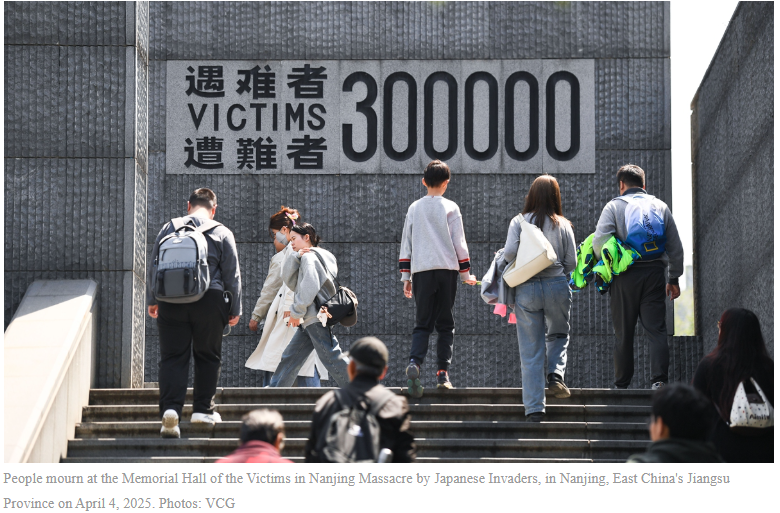Commentaries
Your Present Location: Teacher_Home> Ding Gang> Commentaries‘Nanjing Massacre Studies’ contributes to world peace
‘Nanjing Massacre Studies’ contributes to world peace
Source: Global Times
By Ding Gang
Published: Aug 13, 2025 09:48 PM

This year marks the 80th anniversary of the victory of the Chinese People's War of Resistance against Japanese Aggression. With the release of films such as Dead to Rights and 731 Biochemical Revelations, the historical memory of the Nanjing Massacre has gained new dissemination through artistic forms. These works not only present historical truths but also, through their emotional power, provoke deeper public reflection on war and human nature.
However, relying solely on literature and film, or even on memories and evidence, is not enough to fully and deeply understand the arduousness and greatness of China's War of Resistance.
Everyone who enters the Memorial Hall of the Victims in the Nanjing Massacre by Japanese Invaders is confronted with the following questions: Why did seemingly courteous Japanese soldiers become so brutal in war? How did their inhumane psychology form? Why did Japanese culture fail to impose the most basic humanitarian restraints on the national psyche? Answering these questions requires in-depth study from multiple disciplines, including psychology, anthropology, cultural studies and ethics.
More than a decade ago, I called for the establishment of "Nanjing Massacre Studies" as a global academic field. Today, looking back, we can see that research on the Nanjing Massacre has made significant progress. The Institute of National Memory and International Peace (formerly known as the Institute of Nanjing Massacre History and International Peace) was officially established in 2016 and designated as a key high-end think tank in East China's Jiangsu Province. Related research outputs have been fruitful, and mechanisms for cultivating talent have been gradually improving.
However, compared with the comprehensive, multidisciplinary research that Jewish scholars have conducted on the Auschwitz genocide, China's study of the Nanjing Massacre still shows a clear gap - it remains largely confined to a few fields, such as history and education, and has yet to form a complete disciplinary system like "Auschwitz Studies."
Looking back at Jewish efforts, they transformed "Auschwitz" from merely a place name and historical event into a global symbol - an academic emblem of 20th-century genocidal ideology. Universities across Europe and the US offer dedicated courses and research centers on the Nazi genocide, forming a complete educational pathway from the master's to doctoral level. In Western political science, philosophy, psychology, international relations, education, religious studies and theology, as well as other non-historical disciplines, one can see scholarly achievements based on Auschwitz research, which in turn have propelled the development of those fields themselves.
Chinese experts have also recognized this gap. At the 2023 Academic Committee Conference of the Institute of National Memory and International Peace, experts unanimously emphasized the importance of interdisciplinary research. Some scholars argued that the study of the Nanjing Massacre has moved beyond the "accumulative phase" and now requires "conceptual production and category formation" from the intersecting perspectives of philosophy, literature, sociology and other disciplines.
Establishing "Nanjing Massacre Studies" is not only an academic task but also a national mission. Deepening research on the Nanjing Massacre and building a systematic disciplinary framework - while inviting broader international participation - will not only more profoundly expose the crimes of Japan's war of aggression against China but also make a significant contribution to peace in Asia and the world.
Moreover, developing "Nanjing Massacre Studies" into an independent discipline is not only a matter of academic institution-building but also a strategic need for China to participate in shaping global historical discourse. In the current contest among nations over the interpretation of World War II memory, whoever can transform historical narratives into a universal academic language will gain greater discursive influence on the international stage.
Only in this way can we ensure that this history is not forgotten, and that the "Nanjing Massacre," like "Auschwitz," becomes part of humanity's shared memory and a source of ideas for building a global culture of peace.
The author is a senior editor with the People's Daily and currently a senior fellow with the Chongyang Institute for Financial Studies at the Renmin University of China. dinggang@globaltimes.com.cn. Follow him on X @dinggangchina























































































 京公网安备 11010802037854号
京公网安备 11010802037854号





